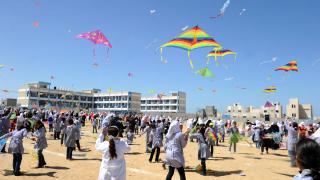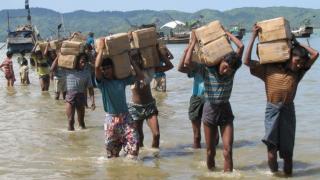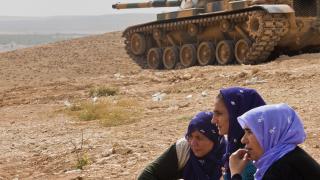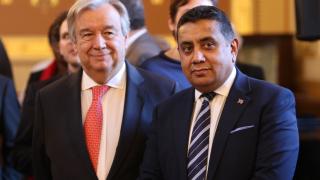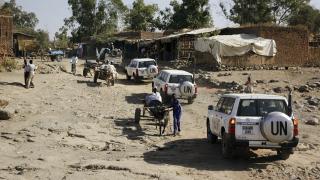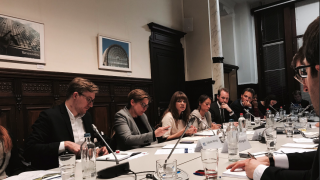UNA-UK is appalled by the apparent use of chemical weapons yet again in Syria. We are horrified by the reports received from UN agencies and partners on the ground that an estimated 500 people seeking assistance have signs of exposure to toxic chemicals, inculding respiratory failure. More than 70 people are thought to have died, and two health facilities have been affected by the attacks in Eastern Damascus on 7 April.
We believe that the international community cannot stand by when chemical weapons are deployed. The use of chemical weapons has long been prohibited under international law. In 2013 Syria signed the Chemical Weapons Convention, adding the duties of that treaty to the legal and moral prohibitions on chemical weapon use. Ensuring that their use remains taboo is crucial in preventing further loss of life and suffering, and in upholding our hard-won rules-based international system.
When such horrific acts occur, the compulsion to act is strong. Time and again, the international community has resolved to "never again" watch from the sidelines in the face of atrocities. More than a decade ago, this resolve was translated into the 'responsibility to protect' (R2P) - a principle endorsed by all UN member states.
However, any action taken by the United Kingdom, or any other power, must be placed within the context of the wider civil war in Syria - a war which has claimed nearly half a million civilian lives and which shows no sign of ending. UNA-UK believes it vital that any course of action is considered in terms of whether or not it is likely to reduce the chance of future chemical weapon use and whether or not it is likely to significantly prolong the conflict, thereby causing further suffering and loss of life. Given the presence of major powers and regional actors on the ground, the prospect of escalation must also be of concern.
UNA-UK does not believe that hasty recourse to military strikes meets these tests at present. We are concerned that, once again, the responsibility to protect is being reduced to military intervention before other possible courses of action have been considered.
First, on the question of accountability, it is clear that there must be no impunity for chemical weapon use. As the UN Secretary-General has said, "the seriousness of the recent allegations requires a thorough investigation using impartial, independent and professional expertise" and "a dedicated mechanism for accountability". The Organisation for the Prohibition of Chemical Weapons (OPCW) must be allowed to investigate the recent attacks, as it has in the past, to establish the facts and pave the way for prosecution at a later stage. Russia must not be allowed to claim that a proper investigation was impeded by strikes and that it is therefore not possible to say what happened.
It is deeply disappointing that the UN Security Council was not able to adopt a resolution supporting an investigation. In practice, even an unsatisfactory compromise resolution would probably have enabled investigations to move forward and leave open recourse to punitive action. While relationships between the permanent members are especially fraught at present in the context of the Salisbury poisoning, it is frustrating that these broader issues may have prevented compromise.
Second, on the question of preventing future attacks, UNA-UK urges caution with regard to military strikes. While we do not believe that the tests set out above are presently met, should the situation change, we strongly urge that any such decision is approaced with regard to due process. Under the UN Charter, military action - including action motivated by R2P - requires a resolution from the Security Council. Russia would doubtless veto any such resolution in relation to Syria. However, efforts by the UK, US and France to initiate discussions would serve to demonstrate their good faith and commitment to due process. It would also help to establish global political opinion on the potential use of force. A vote of 14-1 in favour of action (or, more likely, 12-3) would signal that the wider international community considered the action to be "illegal but justified" (the term used by the Independent International Commission on Kosovo regarding NATO's 1999 bombing campaign).
Should such a course of action be deemed justified, it is vital that all actors involved are clear on the scope and objectives of military action; that they exercise 'responsibility while protecting'; and - above all - that they are prepared with a long-term strategy for the country and region, including several years of political, financial and practical conflict resolution, peacekeeping and peacebuilding support. This does not appear to be the case at present.
With the high risk of escalation and the complex patchwork of actors on the ground, UNA-UK considers it unlikely that a responsible military intervention will be possible any time soon. As we have seen, too weak a response is unlikely to make civilians safer. A stronger response, meanwhile, is likely to lengthen a war which has arguably already been prevented from reaching a natural end by external forces repeatedly intervening whenever one side appears to be close to victory.
It is also likely to raise suspicions as to whether regime change is the true objective. While it is hard to imagine a sustainable peace in Syria with Assad in situ, and it is imperative that he face justice, it is Syrians who should ultimately decide his fate. UNA-UK believes that Western insistence on his removal as a precondition for talks was a mistake, and that his removal should be instead seen as the desired end point for negotiations.
Nevertheless, a response to this appalling incident is required, and UNA-UK does not believe that the international community has exhausted its options for action.
The UK and its allies should consider more and tougher sanctions not just on Syria, but its backers. States such as the UK should explore the possibility of applying universal jursidiction for violations of international law. More should be done to isolate Syria diplomatically and to exclude or expel them from UN forums (it is ridiculous, for instance, that due to the UN's arcane rule on rotating responsibilities, Syria will enjoy the symbolic role of 'president' of the Conference on Disarmament from the 28 May - 24 June).
Other forms of pressure must be bought to bear on Syria's allies, particularly Russia. Additional sanctions would hurt economically. A World Cup boycott would hurt its image. And a concerted attempt to seize, say, the London-based assets of President Putin's friends would no doubt hurt politically.
The UK also needs to consider how its response sits within a wider strategy for Syria and for preventing atrocities. UNA-UK has drawn attention to the absence of a comprehensive UK strategy for atrocity prevention. The fact that the UK's response to the repeated use of chemical weapons in Syria has been characterized by long spells of inaction interrupted by occasional suggestions of a military response is further evidence of this missing coherence and consistency.
With regard to Russia, UNA-UK believes the UK should approach it as a waning power making increasingly desperate and dangerous attempts to demonstrate its continuing global relevance. Talking up the threat from Russia plays into the hands of the Russian Government as it seeks to convince its domestic audience that its actions are seen to matter. The UK's response should stress that actions in contravention of global rules and norms only serve to demonstrate Russia's weakness, and that Russia can only remain a credible and effective force if it plays a constructive role in forums, such as the UN, which still reserve positions of privilege for the big powers of 1945. On occasion, letting Russia play a lead role if that serves broader objectives, as was the case in 2013 with the creation of the joint UN-OPCW investigative mechanism could form part of just such a strategy. In this regard Ambassador Pierce's comments questioning Russia's right to a Security Council seat represents a promising start.
Photo: Damascus. Credit: Muslim Aid

